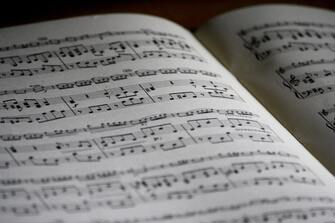
In today's post, I will be sharing what you and your students need to know about copyright and how it pertains to the sheet music you purchase and/or download.
Do you know the ins and outs of copyright law? Keep reading to find out!
You've probably heard the term "public domain" applied to sheet music. But what exactly does that mean?
At the time of this writing, music originally published in 1926 or earlier is in the public domain in the United States. Copyright laws vary by country, so when in doubt, a Google search should tell you whether a piece is in the public domain where you live.
While the music itself may be in the public domain, remember that the sheet music edition you are using of a piece may still be under copyright. For example, while Beethoven’s piano sonatas are in the public domain, many printed editions of the sonatas that you find will still be under copyright because they were edited, typeset, and published after 1926.
A good, reputable resource to find free, downloadable sheet music that is in the public domain is imslp.org, found HERE.
Music published in 1927 or later in the United States (at the time of this writing) is still copyrighted. It is a violation of copyright law to copy, arrange, or distribute copyrighted music without the permission of the copyright holder.
What about "fair use" of sheet music?
You’ve probably heard the term “fair use” in regards to the educational use of copyrighted music. However, this term is often misunderstood.
What exactly is covered under fair use? Here are a few examples of situations that would be considered fair use of copyrighted music:
- Copying a page from a book you or your student owns to avoid a tricky page turn.
- Copying a page from a book you or your student owns to write on for theory analysis or study purposes.
- Making an emergency copy of a piece for temporary use (for example, if a student loses his or her book the day of a recital performance and needs a replacement copy right away) provided that the copy is destroyed and replaced with a purchased version of the piece as soon as possible.
- A good rule of thumb to remember: "fair use" typically applies to using an excerpt of a piece that is no more than 10% of the total work and cannot be performed on its own.
What is NOT covered under “fair use”?
- Making copies of complete pieces from a book you own to distribute to your students or friends.
- Creating arrangements of copyrighted music to distribute, whether for sale or for free, without the permission of the copyright holder.
- Uploading or downloading copyrighted sheet music via the internet without the permission of the copyright holder.
How do I know that the digital sheet music I want to purchase or download complies with copyright law?
In the digital era, it is especially important that we make sure that the sheet music we download or share via the internet is done with the proper copyright permissions. On a personal note, I have found my own copyrighted compositions shared without my permission on several websites, including Scribd and Musescore. These are subscription-based sites where many users take for granted that what they find will be posted legally--but unfortunately that is not always the case.
Since both of these sites allow users to upload their own content, there are often cases where users upload PDFs of copyrighted content or exact note-for-note transcriptions of copyrighted works. Uploading and sharing these types of files, even if the user purchased the original files legally, is a violation of copyright law.
If you want to be sure that the copyrighted piece you are downloading was created with the permission of the copyright holder and that the composer will be fairly compensated for his or her work when you make your purchase, I recommend purchasing your digital music from a reputable digital music retailer that offers legally-licensed downloads. A piece of legally-licensed sheet music will include the complete copyright attribution for that piece as well as a watermark that states that the piece is licensed specifically for your use.
A few reputable retailers that I would recommend for purchasing legally-licensed digital sheet music include: Musicnotes, Sheet Music Plus, Sheet Music Direct, and J.W. Pepper. Many music publishing companies also offer legally-licensed digital versions of their publications for purchase through their websites--so check your favorite publisher's website to see if that is the case.
Once you purchase your digital sheet music, remember that the same copyright laws apply to digital music purchases as to hardcopy sheet music. If your purchase is licensed for your use only, don't make multiple copies or share your files with others via the internet.
If you want more details about copyright law, including how it pertains to recordings and performances, I highly recommend the article written by T. Scott Gilligan, a legal advisor for the Music Teachers National Association, found HERE.
What do you think? Do you have any questions about copyright law or experiences you would like to share? Feel free to leave a comment below!

 RSS Feed
RSS Feed